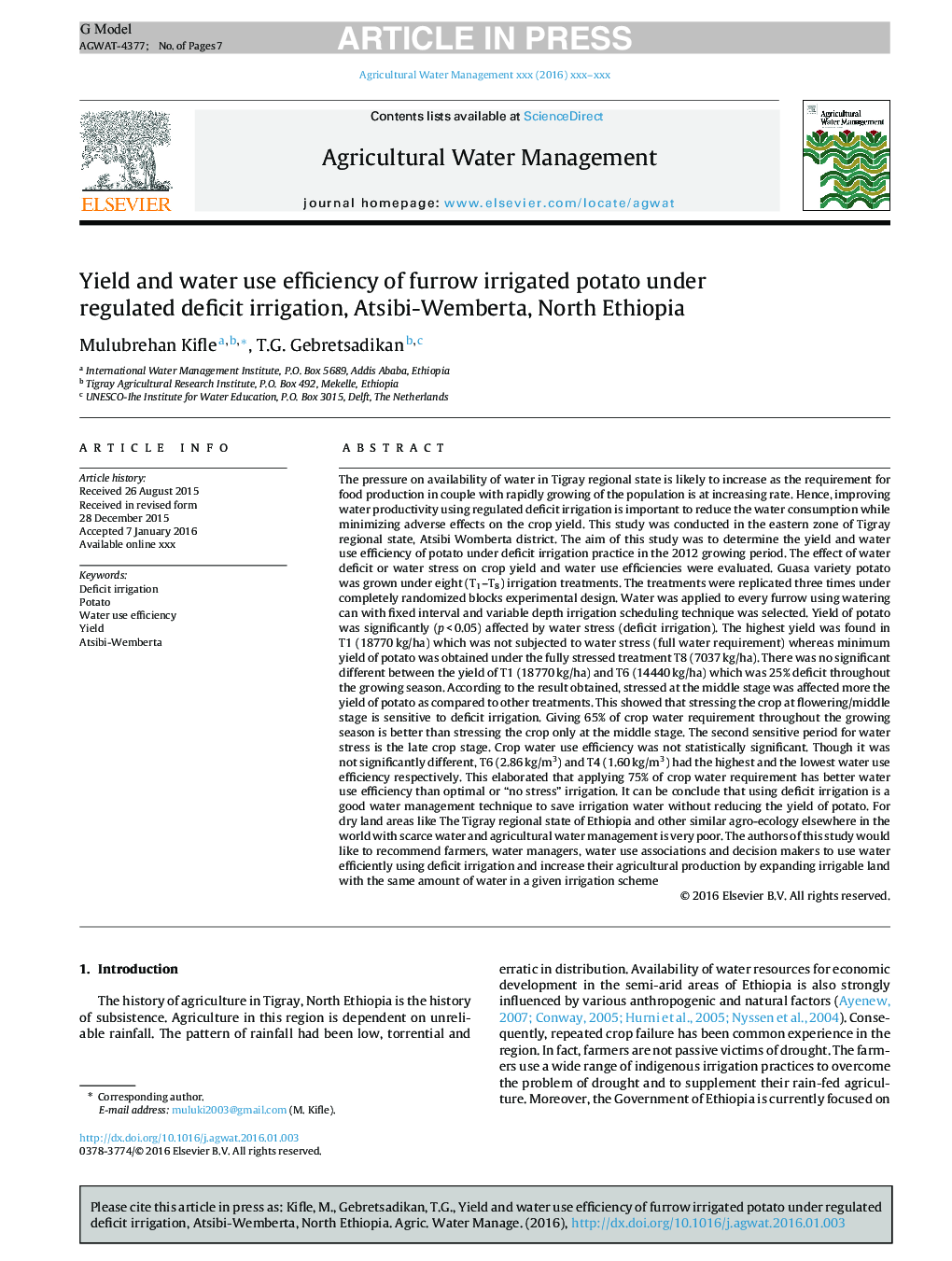| کد مقاله | کد نشریه | سال انتشار | مقاله انگلیسی | نسخه تمام متن |
|---|---|---|---|---|
| 6363535 | 1622910 | 2016 | 7 صفحه PDF | دانلود رایگان |
عنوان انگلیسی مقاله ISI
Yield and water use efficiency of furrow irrigated potato under regulated deficit irrigation, Atsibi-Wemberta, North Ethiopia
ترجمه فارسی عنوان
بهره وری و بهره وری آب سیب زمینی آبیاری فرسودگی تحت آبیاری کم آبیاری شده، ایزیبی-وامبرتا، اتیوپی شمالی
دانلود مقاله + سفارش ترجمه
دانلود مقاله ISI انگلیسی
رایگان برای ایرانیان
کلمات کلیدی
آبیاری کمبود، سیب زمینی، بهره وری استفاده از آب، بازده، اسیبی-وامبرتا،
موضوعات مرتبط
علوم زیستی و بیوفناوری
علوم کشاورزی و بیولوژیک
علوم زراعت و اصلاح نباتات
چکیده انگلیسی
The pressure on availability of water in Tigray regional state is likely to increase as the requirement for food production in couple with rapidly growing of the population is at increasing rate. Hence, improving water productivity using regulated deficit irrigation is important to reduce the water consumption while minimizing adverse effects on the crop yield. This study was conducted in the eastern zone of Tigray regional state, Atsibi Womberta district. The aim of this study was to determine the yield and water use efficiency of potato under deficit irrigation practice in the 2012 growing period. The effect of water deficit or water stress on crop yield and water use efficiencies were evaluated. Guasa variety potato was grown under eight (T1-T8) irrigation treatments. The treatments were replicated three times under completely randomized blocks experimental design. Water was applied to every furrow using watering can with fixed interval and variable depth irrigation scheduling technique was selected. Yield of potato was significantly (p < 0.05) affected by water stress (deficit irrigation). The highest yield was found in T1 (18770 kg/ha) which was not subjected to water stress (full water requirement) whereas minimum yield of potato was obtained under the fully stressed treatment T8 (7037 kg/ha). There was no significant different between the yield of T1 (18770 kg/ha) and T6 (14440 kg/ha) which was 25% deficit throughout the growing season. According to the result obtained, stressed at the middle stage was affected more the yield of potato as compared to other treatments. This showed that stressing the crop at flowering/middle stage is sensitive to deficit irrigation. Giving 65% of crop water requirement throughout the growing season is better than stressing the crop only at the middle stage. The second sensitive period for water stress is the late crop stage. Crop water use efficiency was not statistically significant. Though it was not significantly different, T6 (2.86 kg/m3) and T4 (1.60 kg/m3) had the highest and the lowest water use efficiency respectively. This elaborated that applying 75% of crop water requirement has better water use efficiency than optimal or “no stress” irrigation. It can be conclude that using deficit irrigation is a good water management technique to save irrigation water without reducing the yield of potato. For dry land areas like The Tigray regional state of Ethiopia and other similar agro-ecology elsewhere in the world with scarce water and agricultural water management is very poor. The authors of this study would like to recommend farmers, water managers, water use associations and decision makers to use water efficiently using deficit irrigation and increase their agricultural production by expanding irrigable land with the same amount of water in a given irrigation scheme
ناشر
Database: Elsevier - ScienceDirect (ساینس دایرکت)
Journal: Agricultural Water Management - Volume 170, 31 May 2016, Pages 133-139
Journal: Agricultural Water Management - Volume 170, 31 May 2016, Pages 133-139
نویسندگان
Mulubrehan Kifle, T.G. Gebretsadikan,
